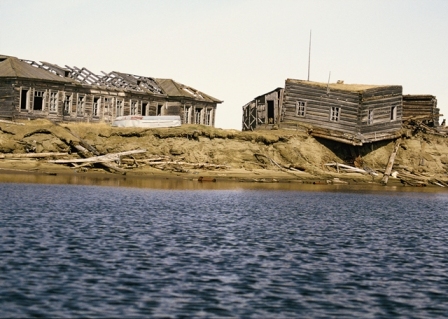Climate Change Introduction
 Melting permafrost led to this house collapsing (Photo: Grida.no - Peter Prokosh)Climate Change or Global Warming refers to the increase in the average temperature of the Earth's near surface air and oceans since the mid 20th century.
Melting permafrost led to this house collapsing (Photo: Grida.no - Peter Prokosh)Climate Change or Global Warming refers to the increase in the average temperature of the Earth's near surface air and oceans since the mid 20th century.The International Panel on Climate Change (IPCC) has concluded that increasing greenhouse gas concentration resulting from human activity such as fossil fuel burning and deforestation are the biggest contributors to global warming.
Climate Change is, in the eyes of many, the key issue in the Arctic and one of the key issues faced by human kind as a whole.
Climate change has been highly disputed and there are those who maintain that human induced climate change does not exist and the swift warming occurring over the two last centuries is a part of the earth's natural cycle.
It can, non the less, be said that within the scientific community there is a relative consensus that global warming is indeed at least partially human induced. The scientists that conclude that human effect is marginal are all but extinct.
According to NASA's Goddard Institute for Space Studies (GISS), the annual mean surface temperature (land and air) for the region north of 64°N (the Arctic Circle is at 66° 33'N) in 2011 was 2.28 degrees Celcius above that which characterized the 1951-1980 period.
Temperatures in the region have been rising rapidly since the late 1970s and have not dropped below the long term mean since 1992, for nearly 20 years.








